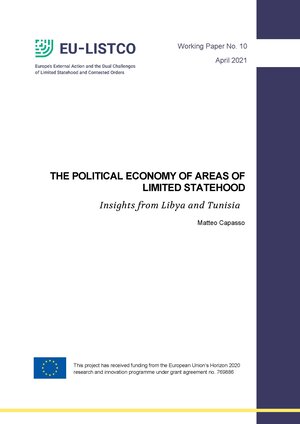
This paper discusses the governance of political economy in areas of limited statehood (ALS) and contested orders (CO) by focusing on the issue of state capture. By linking the notion of state capture to the idea of ALS, the paper investigates how a deterioration of governance can take place when the state fails to mediate the interests of the population vis-à-vis capital, thus favouring the personal gains and rent-seeking activities of the ruling class. Drawing on the cases of Libya and Tunisia, the paper will examine the extent to which processes of state capture dominate the political economy of countries of the EU’s southern neighbourhood (SN). It will place unique attention on the enabling conditions that generate state capture and assess how this process can produce risks or become a source of threat to the EU. In doing so, the paper will also reflect on the implications of the main findings when approaching the question of resilience and how state capture contributes to the wider conceptual discussion on ALS and CO in the SN.